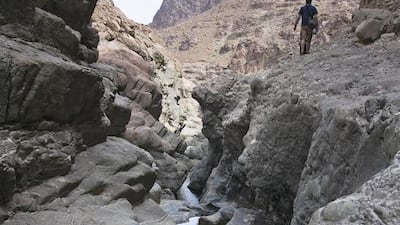FUJAIRAH // The cleanup has started to bring Wadi Wurayah back to its natural state. Much of the graffiti has been scrubbed off and rubbish removed.
But transforming it into what the emirate wants it to be – the country’s first visitor-friendly national park, up to international standards – will take much more.
“You can’t just fence in an area and name it a national park,” said Maral Chreiki, conservation and operations manager at Wadi Wurayah National Park. “A national park should have a functional ecosystem that is respected and maintained.”
Officials closed the park for a cleanup in December to remove the litter and graffiti that covered many of the rocks near the waterfall, one of the country's few freshwater sources.
Park managers have now started training rangers and setting up assessment studies to look into plans for recreational facilities, camping areas and ecolodges.
“Low-impact, pleasant and educational – this is what we aim for,” Mr Chreiki said.
Mohammed Al Afkham, director general of Fujairah Municipality, said he hoped the volunteers from around the region working with the national park programme would help to raise the emirate’s profile and promote tourism.
“We have to take care of what we are using environmentally and make sure we hand it over to the next generation in a good hand,” Mr Al Afkham said.
Last week, park officials finished a two-day mission to set up and maintain camera traps around the park, a step towards restoring endangered species to the wadi. The devices monitor the animals and any illegal activities, such as poaching, that could be happening in the park.
Particularly important is the Arabian tahr, a goat-like animal endemic only to the mountains of the UAE and Oman, preferring slopes that have higher rainfall and cooler temperatures. It is considered endangered because there are fewer than 2,500 mature Arabian tahr, according to the International Union for Conservation of Nature.
Mr Chreiki said another main goal of the trek was to train the rangers in planning field routes and meeting the challenges of each one – some are long or tough, and others have no springs.
“Unless you prepare your route in advance very well, you might get stuck in the mountains or you might end up dehydrated, and basically you might die if you didn’t plan your trip right in the mountains.”
He said he and the rangers had installed two new camera traps and changed the batteries of another six during the trek, a total distance of 32 kilometres.
Those developing the park also hope to map for farms in the area, engage with locals and try to understand whether there are poaching activities to be able to design a park patrol system, said Olivier Combreau, head of the park and conservation adviser for the Emirates Wildlife Society in association with the World Wildlife Foundation.
“It’s about public awareness, monitoring, trying to change the mentality,” said Mr Combreau, a biologist.
Part of keeping native species in is getting invasive, non-native ones out, such as the Indian crow or tilapia fish that have overwhelmed the wadi’s waters.
The value of Wadi Wurayah – named for the swaths of reeds that line it – lies in the many native creatures found there. The wadi is home to the difficult-to-find Arabian toad and a rare orchid, the only one in the UAE, as well as 22 of 34 dragonfly species found in the country.
“This is very high. We have almost 70 to 75 per cent of the total of dragonfly species here,” Mr Chreiki said.
The park covers an area of 200 square metres, located in the Hajar Mountain range, which starts from Oman and ends 300 kilometres north, in Musandam, the governorate of Oman north of Fujairah. It would take two and a half days to walk across, Mr Chreiki said.
“Wadi Wurayah is a typical representative for the Hajar Mountains” in terms of features such as geology and biodiversity, he said.
The Wadi Wurayah project started in 2006 and was named a protected area in 2009. In 2010, the environmental organisation Ramsar named it one of five UAE sites on its List of Wetlands of International Importance.
The Fujairah government and HSBC Middle East are sponsors of the park project.
lcarroll@thenational.ae

